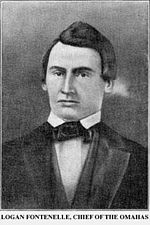
Edward Charles Creighton was a prominent pioneer businessman in early Omaha, Nebraska. The elder brother of John A. Creighton, the Creightons were responsible for founding many institutions that were central to the growth and development of Omaha. Married to Mary Lucretia Creighton in their native Dayton, Ohio, Edward relied on Mary to carry out his request to create a college, which eventually became Creighton University.
Significant events in the history of North Omaha, Nebraska include the Pawnee, Otoe and Sioux nations; the African American community; Irish, Czech, and other European immigrants, and; several other populations. Several important settlements and towns were built in the area, as well as important social events that shaped the future of Omaha and the history of the nation. The timeline of North Omaha history extends to present, including recent controversy over schools.
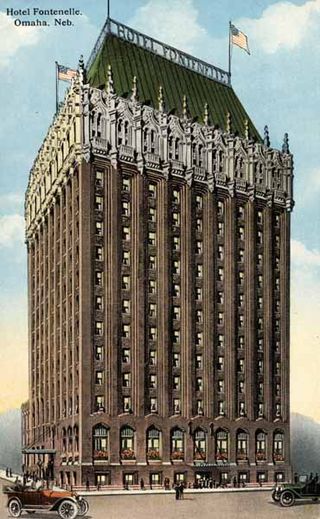
The history of Omaha, Nebraska, began before the settlement of the city, with speculators from neighboring Council Bluffs, Iowa staking land across the Missouri River illegally as early as the 1840s. When it was legal to claim land in Indian Country, William D. Brown was operating the Lone Tree Ferry to bring settlers from Council Bluffs to Omaha. A treaty with the Omaha Tribe allowed the creation of the Nebraska Territory, and Omaha City was founded on July 4, 1854. With early settlement came claim jumpers and squatters, and the formation of a vigilante law group called the Omaha Claim Club, which was one of many claim clubs across the Midwest. During this period many of the city's founding fathers received lots in Scriptown, which was made possible by the actions of the Omaha Claim Club. The club's violent actions were challenged successfully in a case ultimately decided by the U.S. Supreme Court, Baker v. Morton, which led to the end of the organization.
The neighborhoods of Omaha are a diverse collection of community areas and specific enclaves. They are spread throughout the Omaha metro area, and are all on the Nebraska side of the Missouri River.
The Miller Park neighborhood in North Omaha, Nebraska is a historically significant community housing a historic district and several notable historic places. It is located between Sorenson Parkway on the south and Redick Avenue on the north, Florence Boulevard on the east and 30th Street on the west. The Minne Lusa neighborhood borders on the north, and the Saratoga neighborhood is on the south. Fort Omaha borders the neighborhood on the west. Miller Park is the namesake park in the neighborhood, as well as the Miller Park Elementary School. In 2017, the Miller Park/Minne Lusa area was ranked as having the 2nd highest rate of homicides and other violent crimes out of 81 Omaha neighborhoods.
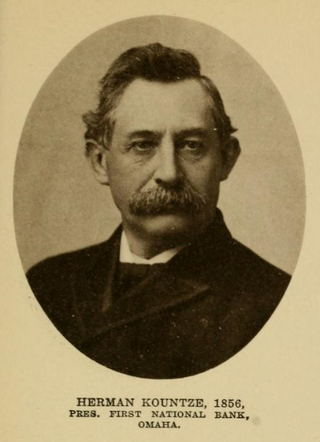
Herman Kountze was a powerful and influential pioneer banker in Omaha, Nebraska, during the late 19th century. After organizing the Kountze Brothers Bank in 1857 as the second bank in Omaha, Herman and his brothers Augustus, Charles and Luther changed the charter in 1863, opening the First National Bank of Omaha that year. Kountze was involved in a number of influential ventures around Omaha, including the development of the Omaha Stockyards and the Trans-Mississippi and International Exposition of 1898. Immediately after his death Kountze was regarded as one of Omaha's "old settlers". Today Kountze's First National Bank is the oldest bank west of the Mississippi River, and continues as a privately held company in its sixth generation of family ownership.
The Omaha Claim Club, also called the Omaha Township Claim Association and the Omaha Land Company, was organized in 1854 for the purpose of "encouraging the building of a city" and protecting members' claims in the area platted for Omaha City in the Nebraska Territory. At its peak the club included "one or two hundred men", including several important pioneers in Omaha history. The Club included notable figures important to the early development of Omaha. It was disbanded after a ruling against their violent methods by the U.S. Supreme Court in 1860 in Baker v. Morton.

Origen Drew Richardson was an American lawyer and politician in the U.S. state of Michigan and in the Nebraska Territory. He served in the Michigan House of Representatives and was the fourth lieutenant governor of Michigan.

Gottlieb Storz (1852–1939) was a pioneer entrepreneur in Omaha, Nebraska. Born in Benningen, Wurttemberg, Storz was the founder of the Storz Brewery. He was an important member of Omaha's German immigrant community, and an important businessman in Omaha history. Storz was regarded as a "giant in the brewing world".
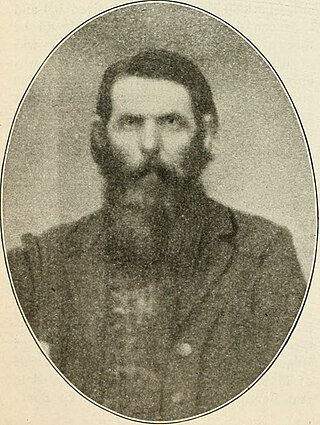
William D. Brown was the first pioneer to envision building a city where Omaha, Nebraska sits today. Many historians attribute Brown to be the founder of Omaha, although this has been disputed since the late nineteenth century. Alfred D. Jones, the first postmaster of Omaha, laid strong claims to the title himself, suggesting that he told Brown about the potential for a town. Brown was also a member of the Second Territorial Legislature for the Nebraska Territory.
The Old Settlers' Association was founded in 1866 by a group of men in Omaha, Nebraska. Membership in the organization was exclusive to settlers who were in the city before 1858. Omaha was founded in 1854. Omaha's Old Settlers' Association was responsible for recording much of the early history of the city.
Miller Park Elementary School is located at 5625 North 28th Avenue in the Miller Park neighborhood in Omaha, Nebraska, United States. The school is credited for creating the original Junior Forest Club concept.

Transportation in Omaha, Nebraska, includes most major modes, such as pedestrian, bicycle, automobile, bus, train and airplane. While early transportation consisted of ferries, stagecoaches, steamboats, street railroads, and railroads, the city's transportation systems have evolved to include the Interstate Highway System, parklike boulevards and a variety of bicycle and pedestrian trails. The historic head of several important emigrant trails and the First transcontinental railroad, its center as a national transportation hub earned Omaha the nickname "Gate City of the West" as early as the 1860s.
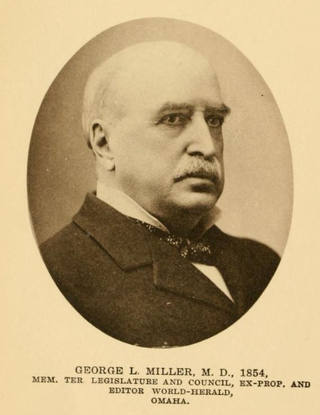
George Lorin Miller was an American pioneer physician, editor, politician, and land owner in Omaha, Nebraska. The founder of the Omaha Herald, which later became part of the Omaha World-Herald, Miller arrived in Omaha in 1854, the year the city was founded. He also promoted Omaha as the route of the First transcontinental railroad and the Trans-Mississippi and International Exposition in Omaha in 1898.
Reuben Gaylord was the recognized leader of the missionary pioneers in the Nebraska Territory, and has been called the "father of Congregationalism in Nebraska." Writing in memory of Gaylord in the early 1900s, fellow Omaha pioneer George L. Miller said, "It was Reuben Gaylord, the brave Christian soldier who brought Sunday into Omaha and the Trans-Missouri country.
James C. Mitchell (1810-1860) was an early settler of Bellevue, Iowa and went on to the found the town of Florence in the Nebraska Territory in 1854.

The Herndon House, later known as the International Hotel and then the Union Pacific Headquarters, was an early hotel located at Ninth and Farnam Streets in present-day Downtown Omaha, Nebraska. Built in 1858 by Omaha pioneer Dr. George L. Miller along with several associates, it was financed by the sale of city-donated land and a $16,000 loan. It was used as the headquarters building of the Union Pacific Railroad for more than 50 years; it was demolished in 1922.

John Irvin Redick was a prominent pioneer professional, public, and business figure in Omaha, Nebraska. He was appointed an associate judge of New Mexico Territory by President Ulysses S. Grant.
Millard Filmore Singleton was an African-American political leader and civil servant in Omaha Nebraska. He was an officer in the Omaha Colored Republican Club and the Omaha branch of the National Afro-American League. He held posts as Justice of the Peace, storekeeper in the United States Internal Revenue Service, recorder of deeds for the city, and as bailiff of the municipal court.

Thomas Lord Kimball was an American railroad executive. Born in Buxton, Maine, he worked various jobs before becoming an agent of the Pennsylvania Railroad Company in 1860. He was appointed to various positions in the company, before moving to Omaha, Nebraska, in 1871 to work for Union Pacific. From there, he climbed the ranks, eventually being promoted to the position of vice-president. Kimball retired in 1897 and died in 1899.

